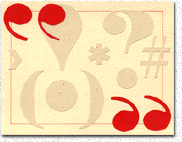| Correct Writing | 2004-05-17 09:24 2 comments |
 by Flemming Funch by Flemming FunchDave Pollard wrote a post about punctuation a little while back, referring to a New York Times op-ed piece on the same subject. Both speaking for the inevitability of relaxing all the rules for how one is supposed to write. Anyone under 25 would probably think this post, and Mr Rosenthal's op-ed, pointless and esoteric. The young are learning to think and write almost entirely in real time, precisely the way they talk, and they have willingly traded off the time and the value that comes from careful composition, editing and reflection, in favour of an iterative, 'successive approximation' means of communicating. In such a world, punctuation may soon be seen as an affectation, not a tool for comprehension.It is probably true that anybody under 25 won't even care, or have no clue what any fuss would be about. The only reason I'm interested in punctuation and the 'correct' way of writing is because I'm very aware that I'm not following the rules, and I don't intend to. So, discussing the subject a bit gives me a bit of a cover and a chance to explain. I frequently start sentences with 'and' or 'but' or 'so'. I often write sentences without any verb. The rule says that if you need a comma after a section in quotes, the comma goes inside the quotes. It looks stupid and I ain't doing it. I feel a little guilty using an apostrophe to say MP3's, but it just happens to be more clear. I guess I've found that I communicate better if I write somewhat like I speak. So, I tend to use commas as much to indicate natural pauses as in any references to where they're 'supposed' to be. So, yes, maybe the different cultures will clash. Or maybe the old rules will just die quietly as nobody cares any longer. To be understood is more important than being correct. |